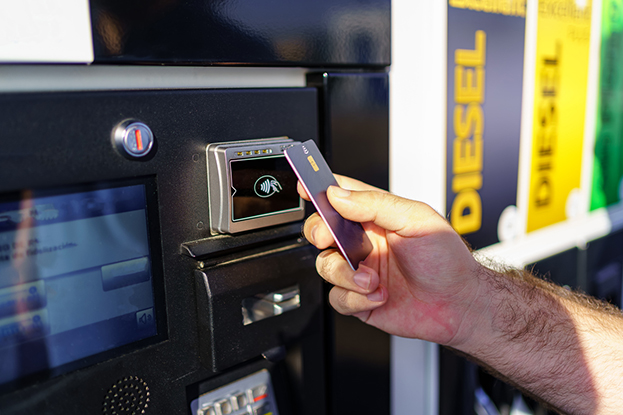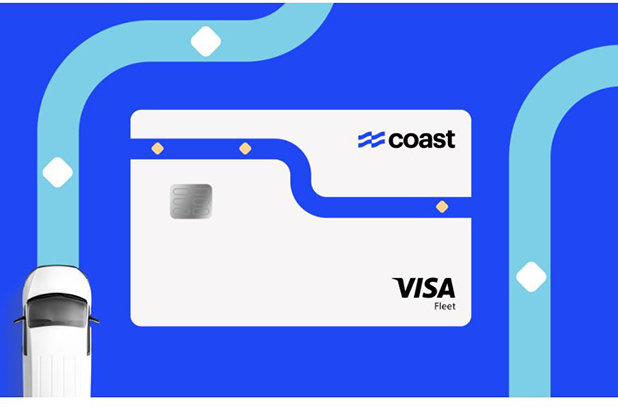Fuel cards are an essential tool for fleet-based companies. With so many different cards on the market, though, it isn’t always easy to decide which one makes the most sense for your business.
The truth is that some cards are better suited for particular industries. Over-the-road (OTR) companies, for example, need a card that supports extensive travel across various regions and helps ensure steady and immediate cash flow. For OTRs, also known as long-haul trucking companies, the right fuel card can help them manage expenses and maintain uninterrupted operations.
With many different cards available, however — Voyager vs. Wex, Comdata vs. Corpay vs. Coast — it pays to know what to look for. In this post, we’ll discuss what long-haul trucking companies should think about when selecting a fuel card.
For other types of field service businesses using a fuel card, e.g. construction, landscaping, or passenger transport companies, Coast might be the right option for you.
What is a fuel card?

Also known as fleet cards, fuel cards are specialized payment cards that allow businesses to purchase fuel and other vehicle-related expenses. Safer than cash and more convenient than getting reimbursed, they make life easier for drivers while providing businesses the ability to control and track spending.
Fuel cards often provide discounts on fuel purchases. Some also offer rewards that can be accrued and used towards future purchases or redeemed as cash.
What are the different types of fuel cards?
Some cards are tied to specific fuel brands, like Shell or BP, and are accepted only at affiliated stations. They generally offer good discounts and loyalty rewards for purchases made within the brand’s network.
Other fuel cards are specifically designed for fleet management. These cards usually come with security features, such as real-time alerts and the ability to turn off lost or stolen cards. They also have advanced features for monitoring and controlling fuel expenses. These sometimes extend to vehicle maintenance services and other purchases as well as fuel.
It’s important to be aware that most fuel cards are charge cards, not credit cards. While credit cards allow users to carry a balance, charge cards require payment in full each month.
What Should Different Types of Businesses Think About When Comparing Fuel Cards?

There are dozens of fuel cards on the market these days, many boasting features such as strong customer service and fraud protection that are universally important.
Some features, however, are particularly relevant to OTRs. These include payroll, factoring, and cash withdrawal, all of which cater specifically to the needs of long-haul trucking companies. Below, we share some of the most important features that OTRs should look for.
Businesses that don’t have these needs can consider a smart fuel card like Coast that offers open-loop acceptance, powerful software for reporting, card management, real-time visibility into transactions, and integrations with your other fleet tools.
Closed vs. Open Loop Cards
Some cards are closed loop, meaning they only allow purchases within a certain network of fuel retailers. This could be based on brand, geography, or association with a particular fuel card company. While some closed-loop cards offer enticing rewards, their networks may be too restrictive for OTRs, whose truckers may frequently travel outside the bounds of a given network.
Open loop cards, in contrast, can be used at any fuel station that accepts Visa, Mastercard, or other widely accepted card networks. Open loop cards are more convenient for drivers and mean fewer detours to find in-network stations. That, in turn, translates to faster travel times and less money spent on fuel.
Factoring
Thanks to a combination of high operational costs and long payment times, trucking businesses often struggle with cash flow. Factoring allows them to sell their invoices at a discount in return for immediate cash. The factoring company then takes on the responsibility of collecting the full payment from the customer. This arrangement helps trucking companies maintain a steady cash flow so they can cover essential expenses like fuel, maintenance, and payroll.
Factoring costs can vary widely depending on the volume of invoices, the creditworthiness of customers, and the length of the payment terms. OTR businesses should keep a close eye out for hidden fees and be sure they understand funding limits, invoice minimums, contract lengths, and penalties for early termination.
Cash Withdrawals
Fuel cards that facilitate cash withdrawals provide the convenience of cash while reducing the need to carry large amounts of it. Drivers can access cash as needed for on-the-road expenses such as minor repairs, tolls, and daily allowances. In emergencies, such as vehicle breakdowns, having access to cash ensures that drivers can manage situations promptly without waiting for company approvals.
Payroll
Recognizing the logistical challenges that trucking businesses face in managing both fuel expenses and payroll efficiently, some fuel card companies have expanded their services to include payroll solutions. Some companies provide payroll cards, which function like debit cards. These cards can be loaded with the employee’s earned wages each pay period. Employees can use these cards to withdraw cash, deposit money in personal accounts, make purchases, or pay bills. Payroll cards are especially useful for employees who do not have traditional bank accounts.
Top Fuel Cards

Voyager vs. Wex, Comdata vs. Corpay vs. Coast — we’ve selected five popular cards, each with its own set of features and benefits, for a closer look.

Coast Cards
Coast offers security, account management, and convenience with very little in the way of fees. The card gives business owners set policies to control purchases specific to individual drivers or vehicles and access real-time reporting data with line-time purchase detail—for example, you can see the grade of gas purchased and the number of gallons. For even more visibility, Coast offers integrations with telematics, fleet management, and accounting tools.
Coast cards give users rebates on every gallon on your statement, as well as 1% cash back on every purchase at non-gas station merchants.* There is a $4/month subscription fee for each active user, $35 returned payment fee and a late fee equal to $35 (or 2.5% of the amount past due), but no transaction, set-up, reporting, or other fees.
- Open loop acceptance
- Real-time reporting
- Robust spending controls
- Useful integrations
- No cash withdrawal
- No payroll
- Not available for companies organized in North and South Dakota, Nevada, and Canada

WEX EFS Fuel Card
The WEX EFS card is designed especially for trucking companies. A closed-loop card, it is accepted at 16,000+ truck stops across North America. It offers both cash withdrawals and cash advances and gives managers access to a number of security controls. These include the ability to set spending limits in real time and create prompts to validate purchases before authorizing transactions.
WEX EFS supports payroll cards, which allow employers to transfer funds to employee cardholders at any time and can be integrated with existing payroll processes and other systems. The card comes with apps that let managers view account statements, pay their bills, and see driver transaction details. They also enable drivers to pay weigh station fees, find fueling stations, and check their card balances.
WEX Capital provides factoring services that give OTRs access to funds from accounts payable within 24 hours. OTRs can choose to have those funds go directly to their fuel card accounts, giving them access to extra rebates and discounts.
- Cash advances
- ATM cash withdrawals
- Advanced spending controls
- Factoring services
- Closed loop network
- Not part of the WEX EDGE Savings Network

Comdata Fleet Card
Like WEX EFS, the Comdata fleet card was created specifically with OTR companies in mind. It comes with fraud monitoring and alerts, customizable dashboards and reports, and 24/7 customer support.
The card gives users access to the OneLook analytics tool which lets them view, track, and manage various aspects of their fleet. It also comes with the handy FleetAdvance mobile app, which allows drivers to see what they will pay at the pump before they fill up.
Comdata has a payroll option as well. Companies can use its Express Cash (eCash) platform to distribute payroll, settlements, reimbursements, and other cash advances to drivers and employees.
Users can get rebates of $0.07–$0.25/per gallon at designated retailers. However, they should be aware that late fees can run to $150 or more and there is an account set-up fee of $50.
Comdata Fleet is a closed-loop card that can be used at over 8,000 truck stops in North America.
- Designed for trucking fleets
- Payroll platform available
- Per-gallon rebates
- Closed loop and relatively small network
- High late fees and setup fees compared to other fuel cards

Voyager Fleet Card
The Voyager Fleet card offers many of the same controls as other fuel cards, including the ability to set limits for daily transactions and dollar amounts per day, week, and month. Managers can also check transactions, download invoices, and run reports to track expenses and compare usage.
The card’s lack of fees is a big plus. Voyager charges just $3 per billing period, with no account setup, transaction, or late payment fees. However, billing periods are on the short side—sometimes as short as 3 days, depending on credit approval, and the card does not offer rebates or rewards.
Although it’s a closed-loop card, Voyager is accepted at more than 320,000 gas stations and truck stops in the United States (according to Voyager, that’s over 97%).
- No set-up, transaction, or late payment fees
- Robust spending controls
- Expense reports and tracking
- Billing periods as short as 3 days
- Closed loop network
- No cash withdrawal or payroll functions

Corpay One Fuel Mastercard
The Corpay One Fuel Mastercard is an open-loop card, accepted at over 160,000 fueling stations. It delivers robust control options, giving users the ability to set limits on when, where, and how often the card is used by each cardholder. This includes the ability to restrict spending by merchant category, such as fuel or travel, making it extra flexible. The card comes with detailed reporting and can be integrated with QuickBooks Online, Xero Accounting, Slack, and Zapier.
Customers can earn rebates of $0.08 per gallon for in-network purchases and $0.04 per gallon elsewhere.
Unfortunately, Corpay charges some substantial fees, including a hefty $149 per month for accounts with nine or fewer active cards, late payment fees of $99 or more, and even fees for uploading documents such as bills, invoices, and receipts.
- Open loop acceptance
- Customizable controls and reporting
- Integrations with common business software
- Rebates
- No payroll or cash withdrawals
- Fees on various types of payment including ACH, check, and credit card
Research, Compare, And Save With Coast

When you compare features, Coast offers a flexible option to help field service businesses save money on gas no matter what size fleet they operate, with “open loop” Visa acceptance, real-time reporting, powerful spending controls, and integrations with tools like Intuit Quickbooks.
To learn more, visit coastpay.com.



